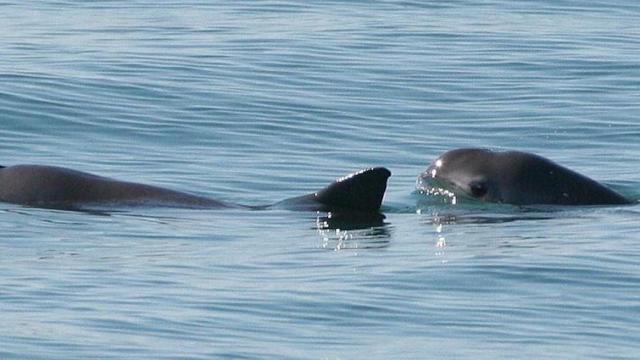The vaquita (Phocoena sinus) is treacherously close to extinction, but the population could rebound without genetic problems related to inbreeding, according to researchers who recently studied the species’ genome.
Vaquitas are 4-to-5-foot-long porpoises that inhabit a narrow stretch of the Gulf of California. The species numbered around 600 when they were first surveyed in 1997. By 2008, that number was down to 200, and now researchers estimate there are around 10 of the animals left on Earth.
Their numbers have dwindled primarily due to the fishing (first legally, and now illegally) of a large fish called the totoaba, also endangered, using gillnets. The totoaba is harvested for its swim bladder, which is valuable in China for its purported medicinal value, according to NOAA.
Gillnets are meant to trap fish by the gills as they are dragged through the water column, but they also catch animals like sea turtles and cetaceans (vaquitas among them), which then drown. Though bans on gillnets have been put in place, they have not been enforced, according to the World Wildlife Fund.
“Our study shows that the vaquita’s risk of extinction is strongly tied to the level of gillnet fishing. With a complete elimination of mortality caused by gillnets, the vaquita has a very high chance of avoiding extinction,” said Jacqueline Robinson, a biologist at UC San Francisco and a co-author of the paper, in an email to Gizmodo. “We should not assume that a species is ‘doomed’ to extinction based on its natural rarity or naturally low genetic diversity.”
Inbreeding is a concern for small populations, which go through something called a genetic bottleneck. Low genetic diversity can result in less healthy animals in the subsequent generations. But according to the recent team’s research, published today in Science, the perilously small vaquita population is at no risk of extinction-by-weak-genes; its sole existential threat is humankind.

The researchers studied the genomes of 20 vaquitas that lived between 1985 and 2017 and modelled the animal’s extinction risk. They found that if gillnet fishing stopped immediately, the vaquita would likely recover.
Other threatened species have indicated a similar ability to withstand genetic concerns. Last year, researchers found that the critically endangered kākāpō, a chubby flightless parrot endemic to islands off the coast of New Zealand, had a genetically robust population despite millennia of inbreeding. There are now just over 200 kākāpōs; the parrot’s main threats are invasive predators like weasels and stoats.
That’s not to say that the vaquitas — should they rebound from the precipice of extinction — are not going to have to deal with a genetic bottleneck. “The vaquita population is now so small that future inbreeding is inevitable. However, our study shows that the negative consequences of inbreeding are likely to be minimal,” Robinson said.
The reason for this is that the animals have few deleterious mutations in their genomes, said Kirk Lohmueller, an evolutionary biologist at UCLA and a co-author of the paper, in a university release. Comparing the vaquitas’ genetic health to 12 other marine mammal species, the team found that vaquitas had the lowest number of harmful mutations.
Though the vaquitas in the Gulf of California are still breeding, illegal gillnet use could easily kill off the last of the animals. Unless bans on gillnet fishing are enforced, the remarkable animals will disappear forever.
More: The Race to Save the World’s Smallest Porpoise From Extinction
Editor’s Note: Release dates within this article are based in the U.S., but will be updated with local Australian dates as soon as we know more.
